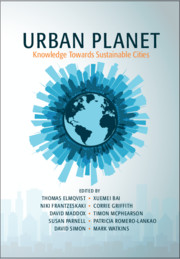43.1 Preamble
Cities last for centuries – but when the climate is changing even faster than fashion, urban planning requires preparedness to experiment. Before entering the lexicon of the billions born after fateful decisions were made to cook the planet, city-making ideas that might repair past damage must be tested in practice, as fractals of the cities to which they aspire.
Then, the children can take the high ground.
Morally, it’s already theirs.
43.1.1 4˚C and Rising
Hot, humid, mid-winter in southern Australia. Space mirrors broken. Schools closed. Kids in the factories. Borgmol Industries bought the skies, stopped us frying. Borgmalazon drones deliver playthings and food. I have a license. I pay my fees. I know all my passwords.
Food’s scarce, tastes awful; rationed, like the water. SiBorg’s TerrorWatch stops crimes before they start. Petty criminals can’t beat SmartCityData. The city is smarter than its citizens. Still, hackers run resistance. Water gets stolen. Wars are started over less.
43.1.2 2˚C and Ecocities
I wake in turmoil, screaming. Matilda’s cool hand on my brow. The wedding ring she laughed at glinting in the morning light. We lie quietly, sunlight playing across the sheets.
Out on the balcony, our vine adds dappled shade and grapes to the breakfast she brought from the café two floors down. We watch the morning flow down the street where people struggle to protect our world from Borgmol and drones and omniscient cities and oceans out of control.
Someone’s got to do it.
The sea wall is being extended. Greenland’s catastrophic ice melt is being matched by Antarctica and glaciers are shrinking fast. We’ve stabilised the climate but the sea will rise for centuries. So we’re retreating in places where we have no choice, or building sea walls and platforms for our cities like Mesopotamians, shaping the land ocean-side to fit the flow of natural systems. Nay-sayers said don’t interfere, let nature run its course – we said screw you, we are nature.
Old cities live on, fractals of the new are added. Adjustments between them take place. Ecological corridors fit the evolving urban form, embraced by new shorelines. If they’re low enough, the sprawling suburbs of the infernal combustion engine are replaced by fish farms. Suburbanites and the rest of the dispossessed are relocated to ecocities.
Our Great Wall was the first. Brutally attacked when just an idea, it’s evolving, its community fused together by our fight for survival.
Solar light rail connects our coastal town of 50,000 to others. Inland, sprawl is undone. Land is released for nature. We still have to fight for it. Wind farms float where coal carriers and tankers once spewed their filth. Our building datum is 15 metres; a pattern repeated: Shanghai, London, Cairo, Guyana, Florida, Mexico, Holland, Vietnam, Bangladesh, the Maldives … we’re achieving the “impossible!”
43.1.3 4˚C and Rising
Sometimes, I see the yellow sky. But I’ve got drugs from the pharmadrones. Everybody takes them. It’s what remains from the ruins of Welfare.
I’m a climate refugee. I came on a small boat, pregnant with hope and child. My son was born and died in a storm that spared everyone else aboard. God help me, haven’t I paid my bills? Didn’t I give you my password? Don’t I have a license to live? Can’t anybody HELP ME?
43.1.4 2˚C and Ecocities
Greenery is everywhere. Matilda and I head up to our apartment building’s roof garden. Circling the lightwell’s cascading vegetation and handrail of flowing water, my 4˚ nightmare begins to fade.
“It’s beauty-in-progress, eh?” says Matilda, “I remember when people thought all new buildings had to be ugly and nature was doomed!”
She’s right. Shackled to a system run by the 1 percent, escaping from ugly reality meant images on screens tracking everything you did. In the prison of daily life you’d make choices as a conditioned consumer but never as a free citizen. There were troops in the streets. Now it’s easy to walk and cycle; easy to meet without appointments, though not all the troops have gone.
In the face of climate change and fascist corporations, reshaping society was never going to be a picnic, but we are the apes that became a force of nature. Now we understand our power. For many, egalitarianism, compassion, and sharing are still dirty words but they’re having to deal with increasing evidence that we can build cities that nurture our lives as citizens and restore the balance of nature.
And when they’re sufficiently provoked to respond in kind, we are flattered by their mimicry.
43.2 PostAmble
We know enough to make the difference between an ecocity future and hell, but the decisions that make that choice must be made now, while the children are young enough to benefit – before they are old enough to express the anger and resentment their elders deserve.

